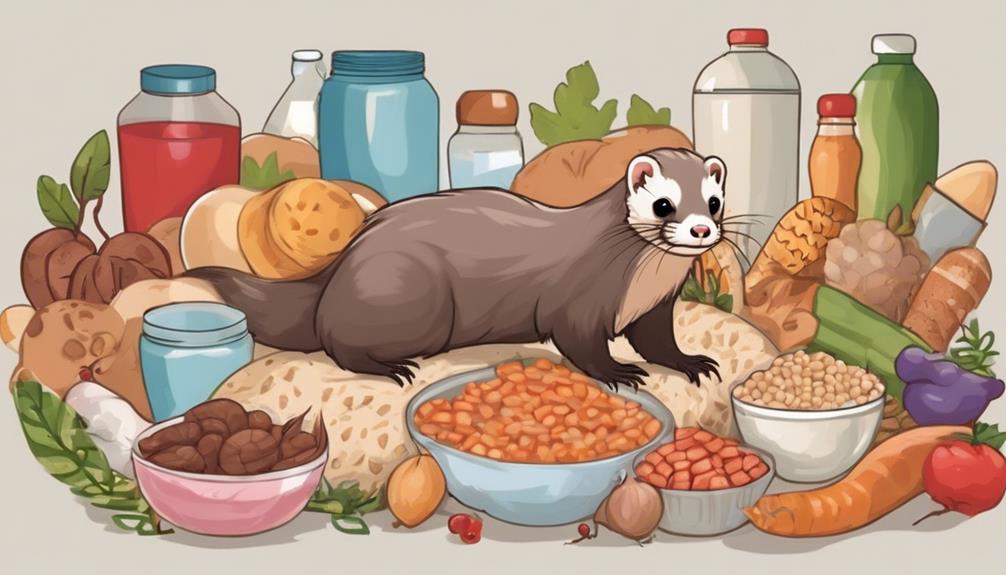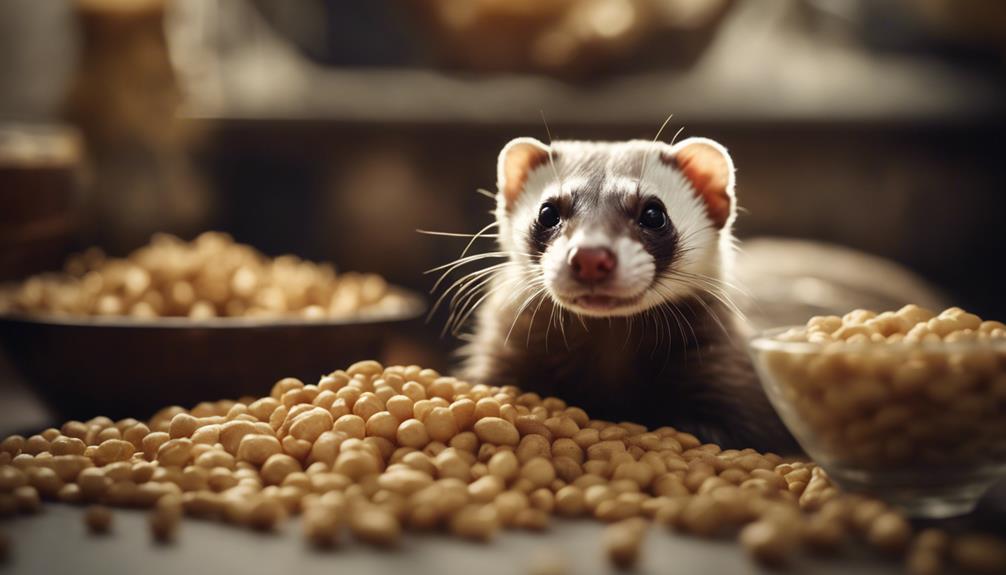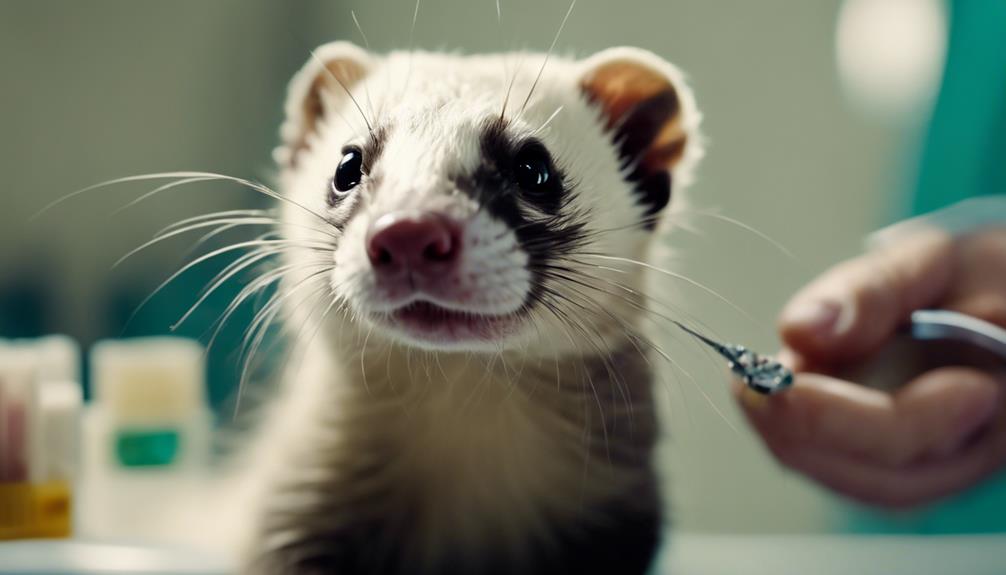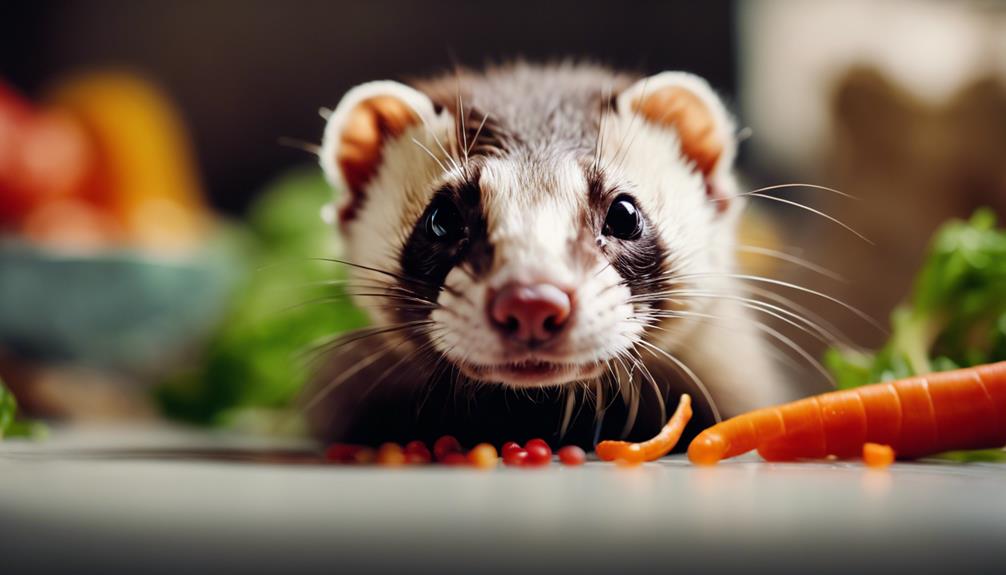What to Know About Ferrets and Food Allergies

Ferrets can develop food allergies, with common allergens including chicken, beef, fish, and dairy products. Symptoms of food allergies in ferrets may include itching, hair loss, ear infections, and gastrointestinal issues.
Management of food allergies in ferrets involves identifying and eliminating the allergen from their diet. This can be achieved through a process of elimination by feeding a hypoallergenic diet or a novel protein diet. Regular monitoring and consultation with a veterinarian are essential to ensure the ferret's health and well-being.
Common Food Allergens in Ferrets

Common food allergens in ferrets include proteins such as chicken, beef, and fish. Food intolerance can manifest in ferrets as an adverse reaction to certain ingredients present in their diet. Ferrets may exhibit symptoms such as gastrointestinal distress, skin issues, or respiratory problems due to these dietary restrictions. It's essential for ferret owners to be aware of these common food allergens to ensure their pets' well-being. By carefully monitoring the ingredients in their ferret's diet, owners can help prevent potential allergic reactions and maintain a healthy nutritional balance for their furry companions.
Understanding the dietary restrictions of ferrets is crucial in providing them with a suitable and safe diet. Some ferrets may have sensitivities to specific proteins, leading to food intolerance issues. By being mindful of the common food allergens and potential dietary restrictions, owners can tailor their ferret's diet to meet their unique nutritional needs, promoting overall health and wellness for these beloved pets.
Symptoms of Food Allergies

Symptoms of food allergies in ferrets can vary from gastrointestinal distress to skin issues and respiratory problems, indicating an adverse reaction to specific dietary ingredients. When a ferret displays signs of a food allergy, it's essential to identify these symptoms promptly to provide appropriate care.
Some common symptoms of food allergies in ferrets include:
- Vomiting and Diarrhea: Digestive issues are a primary indicator of a food allergy in ferrets.
- Itchy Skin: Ferrets may exhibit scratching, redness, or other skin irritations due to food allergies.
- Hair Loss: Allergies can lead to fur loss in patches or overall thinning of the coat.
- Sneezing and Watery Eyes: Respiratory symptoms like sneezing and watery eyes can suggest a food allergy.
- Lethargy: A lack of energy or interest in activities may accompany other symptoms of food allergies.
If these symptoms are observed, it's crucial to consult a veterinarian for proper diagnosis through allergy testing and explore treatment options for managing ferrets with food allergies.
Diagnosing Food Allergies in Ferrets

To accurately diagnose food allergies in ferrets, veterinarians typically rely on specialized allergy testing methods to pinpoint the specific dietary triggers causing adverse reactions in these animals. Allergy testing in ferrets may involve skin testing, blood tests, or food trials. Skin testing, where small amounts of common allergens are placed on the skin to observe for reactions, can help identify specific allergens. Blood tests measure the presence of antibodies against certain allergens in the bloodstream.
Additionally, elimination diets are often employed to diagnose food allergies in ferrets. This involves feeding the ferret a novel protein and carbohydrate source that it hasn't been exposed to before, gradually reintroducing other foods to identify the culprit. While these methods can be effective, they require patience and dedication to accurately pinpoint food allergies in ferrets. Veterinarians play a crucial role in guiding ferret owners through the diagnosis process and ensuring the health and well-being of these beloved pets.
Managing Food Allergies

When managing food allergies in ferrets, implementing a strict diet plan is essential to alleviate symptoms and promote overall health. Allergy testing can help identify specific food triggers, allowing for a targeted approach to managing the condition. Introducing new foods gradually can help monitor for any adverse reactions and pinpoint problematic ingredients.
Here are some key strategies to effectively manage food allergies in ferrets:
- Consult a Veterinarian: Seek professional guidance to develop a tailored diet plan based on allergy test results.
- Read Food Labels: Carefully inspect ingredient lists to avoid potential allergens in commercial ferret food.
- Monitor Symptoms: Keep a detailed record of your ferret's reactions to different foods to identify patterns.
- Rotate Protein Sources: Diversifying protein options can reduce the risk of developing new allergies.
- Consider Homemade Diets: In consultation with a vet, explore homemade diet options using hypoallergenic ingredients.
Allergen-Free Diet Tips

Implementing an allergen-free diet is crucial in effectively managing food allergies in ferrets. To adhere to dietary restrictions, it's essential to carefully read the labels of commercial ferret food to identify potential allergens such as grains, dairy, or certain proteins.
When preparing homemade meals, ingredient substitutions can be made to eliminate allergens while still providing a balanced diet. For instance, replacing wheat flour with coconut or almond flour can help avoid grains that may trigger allergies. Additionally, using novel proteins like duck or rabbit instead of common allergens like chicken or beef can be beneficial.
It's important to consult with a veterinarian to ensure that the ferret's nutritional needs are being met while following an allergen-free diet. By being mindful of dietary restrictions and making appropriate ingredient substitutions, ferret owners can help manage food allergies and promote their pet's well-being.
Introducing New Foods Safely

Introducing new foods safely to a ferret's diet is crucial for preventing potential allergic reactions and ensuring their overall health and well-being. When diversifying a ferret's diet, it's essential to proceed with caution. Here are some key tips to consider:
- Gradual Introduction: Introduce new foods slowly, one at a time, to monitor any adverse reactions effectively.
- Monitoring: Keep a close eye on your ferret after introducing new foods to observe for any signs of allergies or digestive issues.
- Allergy Testing: Consider allergy testing if your ferret has a history of food sensitivities to identify problematic ingredients.
- Elimination Diets: If your ferret shows signs of food allergies, work with your veterinarian to establish an elimination diet to pinpoint the specific allergen.
- Consulting a Veterinarian: Always seek guidance from a veterinarian before making significant changes to your ferret's diet to ensure their nutritional needs are met.
Consulting With a Veterinarian

When it comes to addressing food allergies in ferrets, consulting with a veterinarian is crucial.
A vet can provide expert advice on identifying potential allergens and creating a suitable diet for your pet.
Their professional guidance is essential in managing and treating food allergies effectively.
Vet's Expert Advice
Seeking advice from a knowledgeable veterinarian is crucial when addressing ferrets' food allergies. Veterinarians can provide valuable insights and guidance on managing your ferret's dietary needs.
When consulting with a vet regarding food allergies in ferrets, consider the following:
- Allergy Testing: Discuss the possibility of allergy testing to identify specific food triggers.
- Dietary Adjustments: Your vet can recommend appropriate dietary changes to alleviate food allergy symptoms.
- Supplements: Explore the use of dietary supplements to ensure your ferret receives essential nutrients.
- Homemade Treats: Learn about safe homemade treat options that are suitable for ferrets with food allergies.
- Regular Check-ups: Schedule regular check-ups with your vet to monitor your ferret's condition and make any necessary adjustments to their diet.
Professional Guidance Needed
To effectively address ferrets' food allergies, consulting with a knowledgeable veterinarian is essential for tailored guidance and effective management strategies. Nutrition consultation from a vet specialized in exotic animals can provide valuable insights into ferrets' dietary needs and potential allergens.
These professionals can recommend specific dietary adjustments, such as eliminating common allergens like grains or poultry, and suggest suitable alternative foods to ensure balanced nutrition while avoiding allergic reactions. Veterinarians can also conduct allergy testing to pinpoint specific triggers and develop a comprehensive plan to manage food allergies in ferrets.
Seeking professional guidance is crucial for pet owners to promote their ferrets' health and well-being through proper nutrition and care.
Frequently Asked Questions
Can Ferrets Develop Food Allergies Later in Life, Even if They Have Been Eating the Same Food for Years?
Ferrets can develop food allergies later in life, even if they've eaten the same food for years. Regular food rotation and allergy testing can help prevent and detect allergies early. Owners should monitor their ferrets' reactions to food changes.
Are There Any Specific Ingredients or Additives Commonly Found in Ferret Food That Are Known to Trigger Allergies?
When examining ferret food for potential allergens, ingredient analysis is crucial. Certain additives can impact sensitivities. It's essential to scrutinize labels carefully to avoid triggering allergic reactions in these sensitive pets.
How Long Does It Typically Take for Symptoms of a Food Allergy to Appear After a Ferret Consumes the Allergen?
Symptoms of a food allergy in ferrets can appear within hours to days after consuming the allergen. Early detection is crucial for prompt treatment. Allergy testing can help pinpoint triggers, aiding in prevention and management.
Are There Any Alternative Treatments or Supplements That Can Help Manage Food Allergies in Ferrets?
Supplement options and nutritional support play vital roles in managing food allergies in ferrets. These can include probiotics, essential fatty acids, and hypoallergenic diets. Consulting a vet for tailored advice is crucial for optimal care.
Is It Possible for a Ferret to Outgrow a Food Allergy, or Will They Need to Avoid the Allergen for Life?
Ferrets may outgrow food allergies, but some may need to avoid the allergen for life. Food elimination, desensitization, allergy testing, and dietary rotation can help manage allergies. Consulting a vet is crucial for determining the best approach for each ferret.











